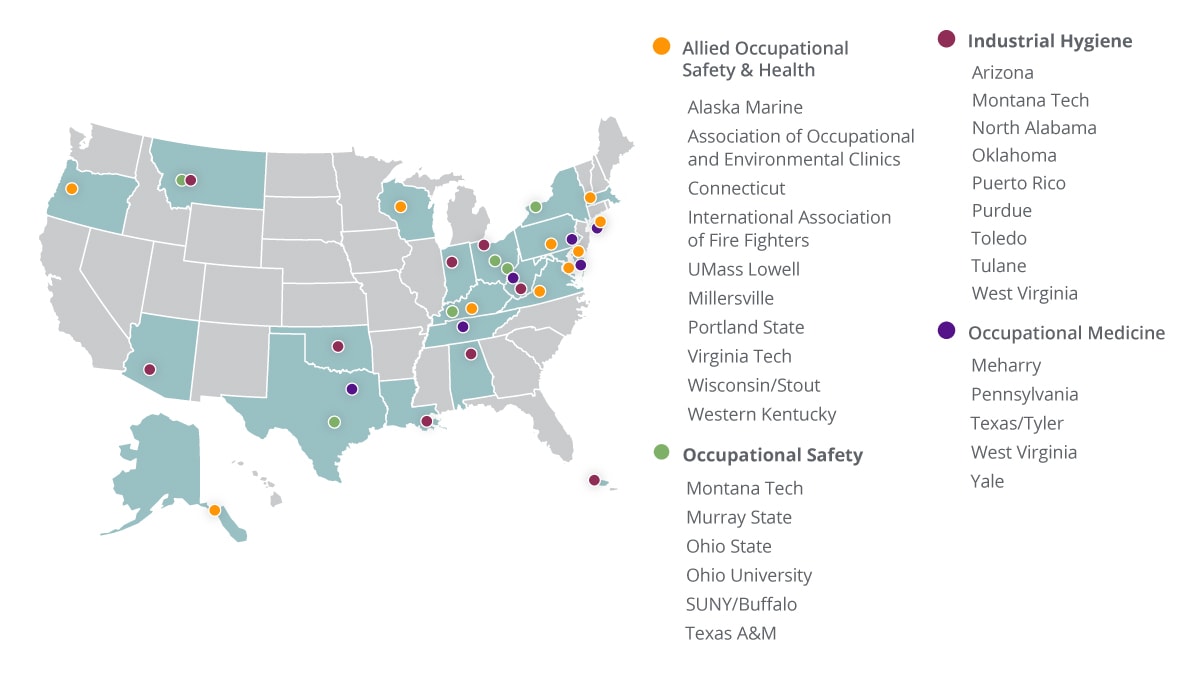Key points
- Training Project Grants (TPGs) help prepare the next generation of occupational safety and health professionals.
- Most TPGs are in academic institutions and support academic programs in occupational safety, industrial hygiene, occupational medicine, and allied disciplines.
- Non-academic TPGs help meet specific training needs.

Purpose
The Occupational Safety and Health Act of 1970 requires NIOSH to provide an adequate supply of qualified personnel to implement it. The TPGs have a key role in meeting this mandate.
This program provides state-of-the-art training for the next generation of leaders in occupational safety and health practice and research. The majority of TPGs are in academic institutions. They provide high quality training though specific undergraduate, graduate, and post-graduate programs. TPGs support traineeships that cover stipends, tuition and fees, and travel for a limited number of students in eligible degree programs.
NIOSH funds non-academic TPGs to meet specific training needs, such as those of firefighters and commercial fisherman. NIOSH also funds Occupational Health Internship Program at the Association of Occupational and Environmental Clinics. This TPG helps increase diversity among health and safety practitioners.
Impact
TPGs play a significant role in preparing the occupational safety and health workforce for the future. They will need to respond to the challenges posed by the changing nature of work. The majority of TPGs are in academic settings and provide well-trained graduates, professionals and researchers who go on to work for:
- Federal, state, and local government agencies
- Non-profit organizations
- Academic institutions
- Industry organizations and businesses
- Healthcare organizations
- Labor organizations
TPGs help meet our nation's need for skilled, knowledgeable practitioners and researchers in occupational safety and health. They also help enhance the diversity of the occupational safety and health workforce.
TPGs

Occupational Safety
Training in occupational safety is multidisciplinary and promotes worker health, safety and well-being to mitigate risks and hazards on the job. These TPGs offer training in occupational safety:
- Montana Technological University at the University of Montana
- Murray State University
- The Ohio State University
- Ohio University
- State University of New York at Buffalo
- Texas A&M University
Industrial Hygiene
Industrial hygiene is the science and art of anticipating, recognizing, evaluating, and controlling workplace hazards. This expertise is used to prevent workplace injuries and illnesses and promote worker health, safety and well-being. These TPGs offer training in industrial hygiene:
- Montana Technological University at the University of Montana
- Purdue University
- Tulane University
- University of Arizona
- University of North Alabama
- University of Oklahoma Health Sciences Center
- University of Puerto Rico
- University of Toledo
- West Virginia University
Occupational Medicine
These TPGs offer occupational medical residency programs for physicians seeking to focus their careers in occupational and environmental medicine:
- Meharry Medical College
- University of Pennsylvania
- University of Texas Health Science Center at Tyler
- West Virginia University
- Yale University
Allied Occupational Health and Safety
Academic Programs
Allied disciplines include occupational ergonomics, occupational epidemiology, occupational health psychology, risk control and environmental / occupational health. These TPGs offer academic programs in allied disciplines:
- Millersville University
- Portland State University
- University of Connecticut
- University of Massachusetts at Lowell
- University of Wisconsin-Stout
- Virginia Tech
- Western Kentucky University
Non-Academic Programs
These TPGs help meet specific training needs for firefighters, commercial fisherman, and occupational safety and health interns:
Funding sources
NIOSH currently funds TPGs under RFA-OH-25-003. Prior competitive segment of TPGs were funded under RFA-OH-22-003 and PAR-15-352.
